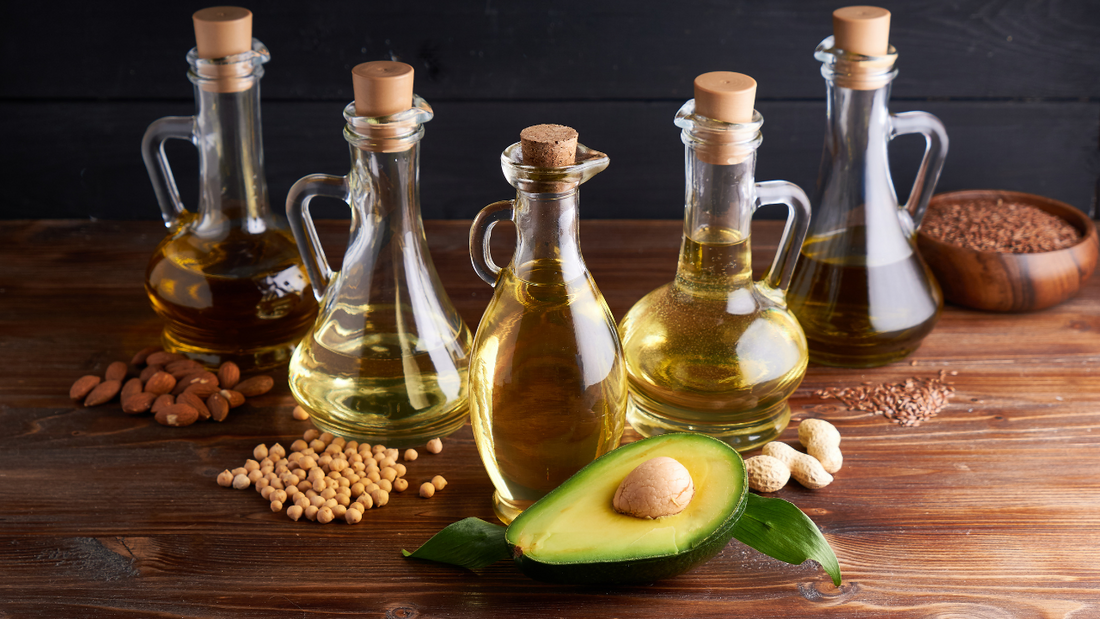
A Complete Guide to Choosing the Best Carrier Oils for Your Skin
When it comes to skincare, choosing the right ingredients is crucial for achieving a healthy, glowing complexion. One such essential ingredient in many skincare formulations is carrier oils.
Derived from nuts, seeds, and plants, these oils play a key role in delivering nutrients to the skin while also serving as a base for essential oils. But with so many options available, how do you know which carrier oil is right for your skin type?
In this guide, we’ll explore some of the most popular carrier oils used in skincare, their benefits, and what to watch out for when using them.
1. Jojoba Oil
Benefits:
Jojoba oil is a liquid wax that closely resembles the natural sebum produced by our skin, making it an excellent choice for all skin types. It is non-comedogenic, meaning it won't clog pores, and it has moisturizing, anti-inflammatory, and antibacterial properties. Jojoba oil helps to balance oil production, making it particularly beneficial for oily and acne-prone skin. Additionally, it contains vitamin E, which aids in skin repair and offers antioxidant protection.
Things to Watch Out For:
Although jojoba oil is generally safe for all skin types, those with extremely sensitive skin should perform a patch test before using it extensively, as individual reactions can vary.
2. Sweet Almond Oil
Benefits:
Sweet almond oil is rich in vitamins A, E, and K, as well as fatty acids, making it highly moisturizing and nourishing. It's excellent for dry and sensitive skin, helping to soothe and repair the skin barrier. The oil’s emollient properties also make it effective in reducing the appearance of scars, dark circles, and fine lines. Sweet almond oil is light and easily absorbed, providing a smooth, non-greasy finish.
Things to Watch Out For:
Individuals with nut allergies should avoid using sweet almond oil, as it can cause allergic reactions. Always check for sensitivity by conducting a patch test.
3. Argan Oil
Benefits:
Often referred to as "liquid gold," argan oil is rich in essential fatty acids, antioxidants, and vitamin E. It is well-known for its hydrating and anti-aging properties, making it a popular choice for mature skin. Argan oil helps to reduce the appearance of fine lines and wrinkles, improve skin elasticity, and protect against environmental damage. Its non-greasy texture makes it suitable for both dry and oily skin types.
Things to Watch Out For:
Pure argan oil can be quite expensive, so it's important to ensure that you’re purchasing a high-quality product from a reputable source to avoid adulterated versions that may not offer the same benefits.
4. Coconut Oil
Benefits:
Coconut oil is known for its deep moisturizing properties, making it ideal for dry, flaky skin. It contains medium-chain fatty acids like lauric acid, which provide antimicrobial benefits, helping to prevent infections and improve skin health. Coconut oil also has a soothing effect, making it useful for treating minor skin irritations and sunburns.
Things to Watch Out For:
Coconut oil is highly comedogenic, meaning it can clog pores and lead to breakouts, particularly in those with oily or acne-prone skin. It’s best used sparingly or on specific areas that require intense moisture.
Due to personal allergies, Davlie products will never contain any coconut. We believe it's important to test every product we share with you, so coconut's out for us!
5. Rosehip Oil
Benefits:
Rosehip oil is a lightweight, fast-absorbing oil rich in vitamins A and C, as well as essential fatty acids. It's renowned for its regenerative properties, making it effective in reducing the appearance of scars, hyperpigmentation, and stretch marks. The oil’s high content of antioxidants helps combat signs of aging and improves overall skin tone and texture.
Things to Watch Out For:
Rosehip oil can cause sensitivity in some individuals, especially those with sensitive skin types. Always perform a patch test before using it widely, and consider mixing it with another carrier oil to reduce potential irritation.
6. Grapeseed Oil
Benefits:
Grapeseed oil is a lightweight, non-greasy oil that absorbs easily into the skin. It’s rich in antioxidants, including vitamin E, and has astringent properties that help to tighten and tone the skin. Grapeseed oil is particularly beneficial for oily and acne-prone skin, as it helps to balance oil production and reduce the appearance of pores.
Things to Watch Out For:
Grapeseed oil is generally safe for all skin types, but as with any product, a patch test is recommended to rule out any potential allergies or sensitivities.
7. Avocado Oil
Benefits:
Avocado oil is a deeply moisturizing oil, rich in vitamins A, D, and E, as well as omega-3 fatty acids. It penetrates the skin easily, making it ideal for dry, mature, or damaged skin. Avocado oil helps to increase collagen production, improve skin elasticity, and heal dry, cracked skin.
Things to Watch Out For:
Avocado oil is thicker than some other oils, so it may feel heavy on the skin, especially for those with oily or combination skin. It’s best used in small amounts or mixed with lighter oils to avoid a greasy feel.
8. Olive Oil
Benefits:
Olive oil is a well-known natural moisturizer, rich in vitamins A, D, E, and K, and antioxidants. It helps to hydrate and repair the skin barrier, making it beneficial for dry and sensitive skin. Olive oil’s anti-inflammatory properties also make it effective in soothing skin conditions such as eczema and psoriasis.
Things to Watch Out For:
Olive oil is quite heavy and can be comedogenic, so it may clog pores if used in excess. It’s best suited for dry skin and should be used sparingly on the face.
9. Sunflower Oil
Benefits:
Sunflower oil is a light, non-greasy oil rich in vitamin E and fatty acids. It has moisturizing and anti-inflammatory properties, making it suitable for all skin types, including sensitive and acne-prone skin. Sunflower oil helps to maintain the skin’s natural barrier, improve hydration, and protect against environmental damage.
Things to Watch Out For:
While sunflower oil is generally safe for all skin types, it’s important to choose high-quality, cold-pressed sunflower oil to ensure maximum benefits and avoid processed versions that may contain additives.
10. Hemp Seed Oil
Benefits:
Hemp seed oil is packed with omega-3 and omega-6 fatty acids, which are essential for maintaining skin health. It’s a lightweight oil that doesn’t clog pores, making it ideal for oily and acne-prone skin. Hemp seed oil helps to balance sebum production, reduce inflammation, and improve overall skin texture.
Things to Watch Out For:
Hemp seed oil is generally safe for all skin types, but it’s always a good idea to perform a patch test before full application. Choose unrefined, cold-pressed hemp seed oil for the best results.
Conclusion
Carrier oils are a versatile and natural way to enhance your skincare routine, offering a range of benefits tailored to different skin types and concerns. Whether you're looking to moisturize, fight signs of aging, or balance oily skin, there's a carrier oil that can help.
Always choose high-quality, cold-pressed oils and perform patch tests to ensure compatibility with your skin. By understanding the unique properties of each oil, you can select the best ones for your skincare needs and enjoy healthy, radiant skin naturally.



